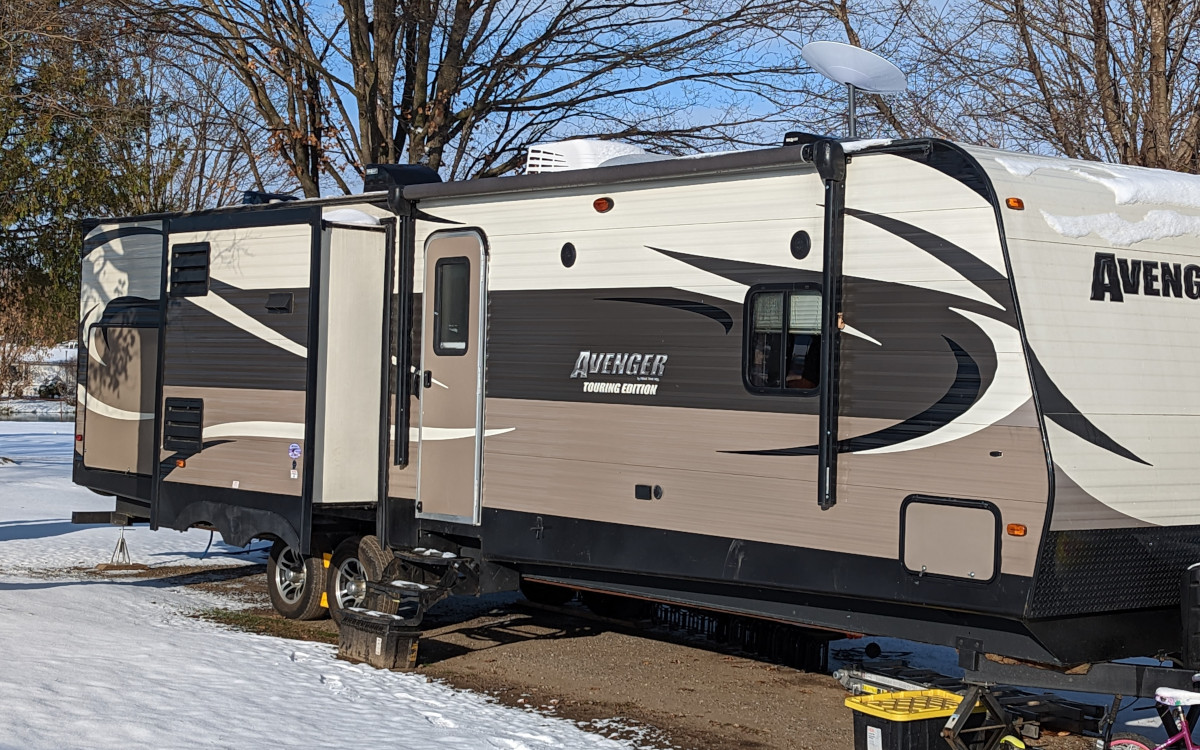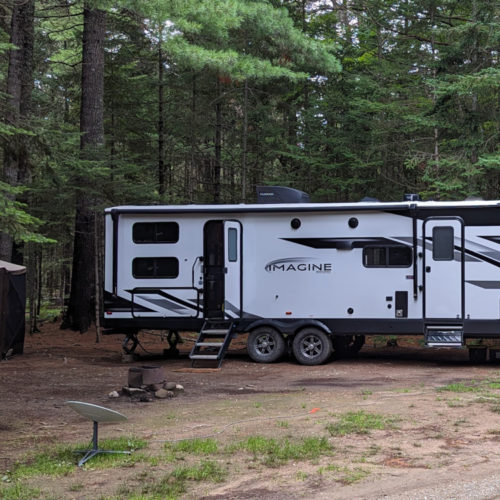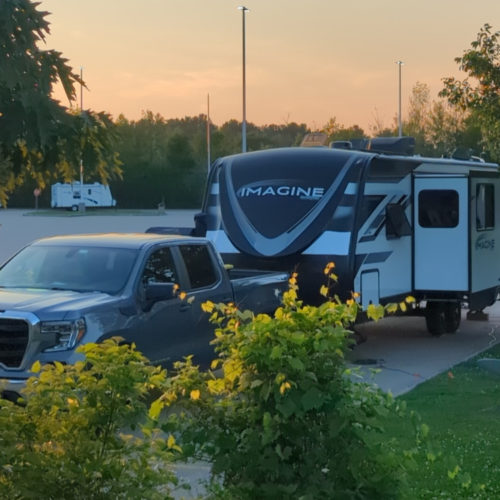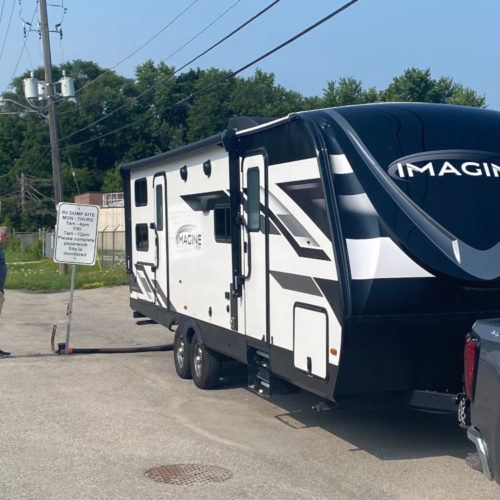There’s a big difference between winter in Florida and winter in Manitoba, but the short answer to this question is yes.
You can stay in a camper in the winter, regardless of where you are. The biggest issues you’ll need to deal with are water and heat. Holding tanks will freeze and most campers don’t have enough insulation, especially for very cold temperatures. Condensation is also a big issue that you need to consider. Your windows will be closed and it’s unlikely you’ll be running the air conditioner. Moisture will build up inside your camper and cause serious issues.
None of these issues are deal breakers if you need, or want, to spend a winter in your camper. Many people do. Some are out of necessity, others because they enjoy a challenge. Regardless, it can be done with some solid planning and preparation.
It’s mid-October and I am writing this article in our camper in New Brunswick. It’s not winter yet, but the temperature is dropping to freezing every night. We still have two more months of it getting colder before we head south for the coldest part of winter. We’ve made some adjustments and are quite comfortable in our camper.
Maintaining a Supply of Water
Running water is the biggest challenge to spending winter in your camper. Freezing pipes are a problem. Water expands when it freezes. The pipes in your trailer are small and made of plastic. When they freeze, they burst. Then you have a real problem. Many of these pipes are in hard-to-access places. Finding a leak from a burst pipe can be difficult. Then you have to repair it.
Without running water, many of the essential functions of your camper won’t function. No water for the toilets. No water for showers and bathing. No water for cooking or dishes. Some of these can be offset by using a campground shower house, assuming you’re in one that is open and serviced in the winter. Cooking and drinking water can be stored in jugs and bottles inside the trailer, but this presents another issue.
Even if you can find a way to store water in your camper, you have no way to dispose of it, short of throwing it out the door. Any water poured down a drain will land in a holding tank where it will freeze.
Many newer campers have a heated and enclosed underbelly and the heat from the furnace fills the space around the tank. This will help keep your tanks flowing during short or mild cold spells, but I wouldn’t count on it during very cold weather. Some campers have heating pads on the tanks that will keep them warmer and extend their use, but you’re one power outage away from disaster.
However, if you’re using your camper for a short stay in the winter, and can live with reduced functionality from your water system, you may find the experience quite enjoyable.
Efficiently heating Your Camper in the WInter
Most RVs lack the insulation to be heated efficiently during cold weather. There are some models that come with a four-season package. They’ll have much higher R-value insulation and more powerful furnaces to combat cold temperatures. But even with these higher-efficiency models, keeping them warm in the winter can be a challenge.
Most camper furnaces burn propane for fuel. It’s a great source of heat. Propane burns clean and hot. It’s not too expensive, easy to store and transport, and it’s available almost everywhere. The big issue with gas heat is it produces a lot of moisture. It’s going to add to the condensation problem that we’ll address in the next section. We try to avoid using the gas furnace whenever possible in favor of electric heat.
The biggest advantage to staying in a camper in cold weather is it’s a small space. It may not be well insulated, but the minimal square footage means it’s easier to keep warm. We prefer a tower-style electric space heater. It stands in our kitchen and does a good job of keeping our camper comfortable. The trade-off is that this heater runs constantly due to heat loss from poorly insulated walls, inefficient windows, and gaps around the slide-outs.
There’s also power consumption to consider. An electric heater can draw a lot of amps. We’ve only got 30 amps of power available in our trailer, so we need to be careful about what outlets we use and which appliances we run. So far it hasn’t been a problem. We run the electric heater set to a constant 18 degrees Celsius. We turn on the gas furnace when we need an extra boost of warmth.
Dealing with Condensation to Keep things Dry Inside your Camper
Spend one night in your camper in cool weather and you’ll see how much condensation can build up on the inside of the windows. That’s just from sleeping. Once you add cooking, bathing, and gas heat into your closed-up trailer condensation can quickly get out of control.
Excess moisture in your trailer can cause all sorts of issues including mold and mildew. It makes the air inside the trailer stale and stuffy and it will not be very comfortable.

There are many ways to deal with condensation in your trailer in the winter. We’ve found the best solution by far is a quality dehumidifier. Our model is much too large for a travel trailer, but it was such a great deal on sale that we had to go for it. It’s rated for 1,500 square feet, and designed to keep a basement dry. In our little 300-square-foot travel trailer, it does an amazing job of keeping things dry.
It’s about as loud as the air conditioning system but only comes on once in a while. During the night, it usually pulls about three to four liters of water out of the air. That’s about a gallon of water, every night. Can you imagine what that much moisture could do to your camper over an entire winter?
Of course, you don’t need a unit as large as ours. A smaller unit, or two, will make a big difference in the air quality inside your camper. If you can keep the air in your camper warm and dry, your winter stay will be much more enjoyable.
You Can Stay in Your Camper in the Winter
Staying in your camper in the winter is absolutely doable. There are many other things that you can do to improve your comfort, particularly for a longer stay. Some people stay in their campers in cold climates all winter long.
Whether it will work for you depends on your willingness to make sacrifices to enjoy winter camping/living in your RV. Have a plan for fresh, clean water. Make sure your heating system is as efficient as possible. Have a plan to keep the air dry and fresh and you’ll be in for an adventure few are brave enough to experience.




